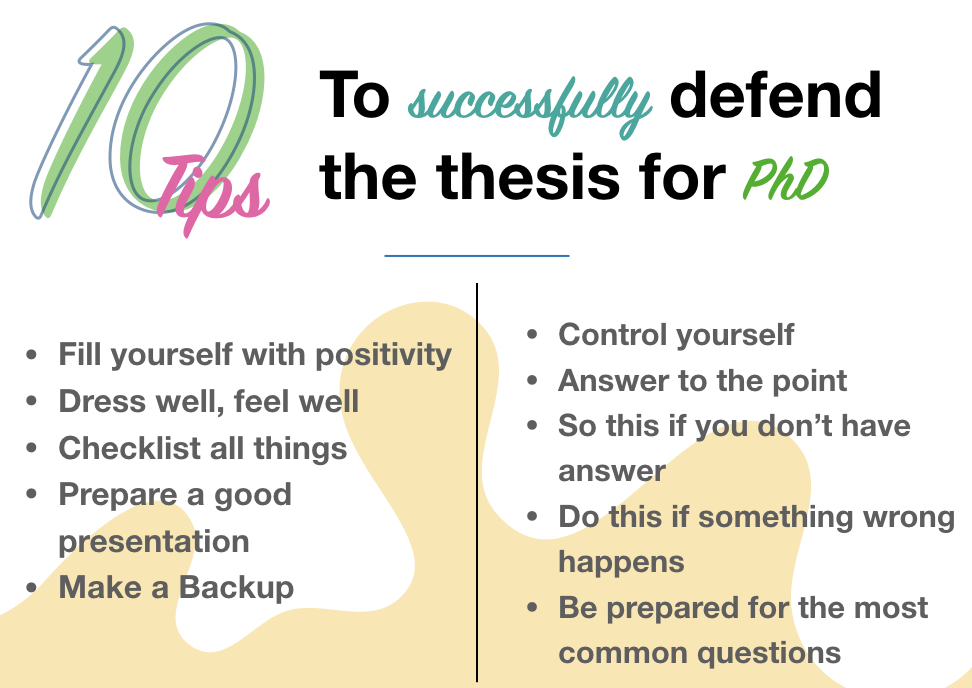A thesis defense is a two-way process of PhD evaluation, a session during which experts ask questions related to the PhD dissertation for awarding a PhD degree.
Defending a PhD thesis or dissertation is the last station of the PhD. The process of a doctorate is different! Even though prospective candidates don’t need to appear in the written examination, the thesis defense is a must!
It’s a process occurring behind closed doors or openly (sometimes!), under the supervision of subject experts or all, to award someone a prestigious doctor of philosophy degree.
PhD- the Philosophia doctor is a path full of complications and problems. Starting from admission to writing a thesis or viva, a candidate has to achieve every milestone to move forward towards a PhD.
Broadly, a good graduation or master’s score, completion of the entrance exam, course work, PhD thesis, publication in a peer-reviewed journal, PhD presentation and well-completed PhD research are criteria to appear in the PhD defense.
If a candidate fails to achieve any of the requirements given above, he or she can’t go-ahead. The PhD is all about research, passion, knowledge on one side whilst depression, lack of confidence, loneliness, frustration on the other side, nonetheless, it is a fun journey.
Defending a PhD thesis at terminal can relax a doctoral student, although should not be taken for granted.
The present piece of content is all about defending your PhD thesis, what is it and how to appear. I will also give you some tips that help you to successfully complete it.
What is a thesis defense?
The thesis defense is the terminal process of discussing ‘research’ to award the PhD degree. It is also referred to as PhD viva too; however, it is more a discussion session than a viva.
A prospective student has to appear in the thesis defense along with the PhD thesis, a presentation and all other PhD related documentation. A student also has to carry all the materials and proofs that can be used to convenience a supervisor or expert to award the doctorate.
The entire process is verbal. Two external subject experts, a guide, and a university VC conducts the process, note that other students can also appear in the PhD defense process too as a guest.
Universities usually conduct close viva sessions to avoid ‘personal bullying’ during the thesis defense.
During the process, questions are based on the thesis content, topic and subject of the prospective student’s research. The objective of conducting the defense session is to check the knowledge of a student, research aptitude and how he or he had done their research.
It is a kind of evaluation process in which experts ask questions and point out gaps in research presented by a student.
Read more: 10 Genuine Suggestions to Design a PhD Title.
What is the process of thesis defense?
The process of PhD thesis defense starts with the general introduction of experts followed by the presentation session. A candidate has to present their thesis in a PowerPoint presentation, keynotes or google slides. 10 to 20 minutes are alloted to present the work in 15 to 25 slides.
Soon after, experts ask questions related to research. Several of them are,
What is the purpose of the present research?
Why is the present topic chosen?
What is the study population and why only those are selecting
What are the outcomes of the present work?
Why are the results or outcomes important?
What are the societal benefits of the present work?
How or what the present research contributes to the present knowledge?
These are the common questions asked to know the quality, quantity and strength of the research one has conducted.
The process is of two types; close thesis defense viva and open thesis defense viva.
In the close thesis defense viva, only a subject expert and a PhD supervisor conduct the entire process of the thesis defense, no one is allowed to interfere in it. A student can defend their thesis confidently, on the positive side, however, sometimes the integrity of the session doesn’t maintain due to lack of a monitoring body.
During the open thesis defense, anyone can appear in the viva session including students of master’s and graduation. Also, anyone can ask questions related to the topic.
Open thesis defense sometimes makes things harder for the prospective student. Which type of viva or defense system you have to face will depend on the university. The process and type of thesis defense vary from country to country and university to university.
2 to 5 examiners or external evaluators are invited for a PhD thesis defense session by the university. The criteria to select examiners for the same are; they should be not from the university, they are experts in a related subject, they are working outside the university.
University allows a PhD supervisor to the defense session but they can’t participate in the discussion. Examiner examines the thesis and will randomly ask queries to the presenter.
Who conducts a thesis defense?
The thesis defense of master’s, M Phil or PhD is held by the university under the vigilance of the supervisor for the student appearing in the degree.
A PhD supervisor invites two or three other experts of the subject to conduct the session, university presentative or vice-chancellor closely monitors the entire process, if present.
Related article: How much does a PhD Degree Cost in the USA, UK and India?
How long a thesis defense occurs?
Per student 10 to 20 minutes are allotted to defend the thesis, however, it may vary, depending on how long a verbal questioning session happens. If it is interesting, it may take up to 2 hours.
Sometimes, experts wind things in 30 minutes too; that depends on how neatly you have written your thesis and how beautifully you have given your presentation. Still, a few questions are common and asked in every thesis defense.
Usually 20 minutes to 2 hours it takes to complete the thesis defense.
What happens after the completion of the thesis defense?
Defending a thesis isn’t like giving a written exam, which means the results are not like ‘pass’ or ‘fail’. The results are like how excellently one has done their doctorate- research, thesis and presentation.
There are three possibilities after completing the PhD viva or thesis defense.
- First, you have successfully completed it.
- Second, you have failed in defending the thesis- revision required.
- Third, there are chances of improvement- minor revision required.
When you present your thesis excellently, write the dissertation in a proper way and accurately- like a professional writer, proofread it correctly, complete all the objectives mentioned in the thesis, done research in a proper way, you probably come in the first case.
A PhD degree will be awarded to you soon!
If a thesis is not written in a good way, not all the objectives are completed, not published a paper, or fails to write a thesis completely or it is partially incomplete, you fail in defending the thesis, need revision.
In this case, you have to re-appear in the Ph.D. to complete the incomplete work.
The third case is a bit different in which a student is advised to do some minor changes and improvements to make their own thesis much better. Usually, re-viva is not conducted in these cases.
In the second case, in which a student fails to defend their thesis, re-viva and second round of thesis defense will be conducted after six months or a year.
Note that awarding the thesis entirely depends on the external examiner.
Also read: PhD vs PsyD- Differences.
Can anyone fail in the thesis defense?
I can say yes! But not exactly because it is not an examination. A candidate has to appear again after sometimes to defend the thesis. Here are the cases in which we can say, a candidate failed thesis defense.
- Improper, incorrect or partial thesis.
- Incomplete objectives.
- Incomplete research work.
- Lack of significant outcomes.
- No publication
- Fail to answer questions during the defense.
Practically it is not considered as ‘fail’, re-viva or another round of thesis defense will be conducted.
Tips to successfully defend the thesis for PhD:
When you will be on your presentation, an examiner opens your thesis; thoughts of curiosity, nervousness, excitement and energy will flow around you, all at once.
In these conditions, even if your preparation is excellent, a small mistake can ruin everything for you.
You have to balance your positive as well as negative emotions at the same time. Here are some of the tips that definitely help you to defend your PhD thesis successfully.

Fill yourself with positivity:
You are very near to your goal, one step ahead of getting a degree- an utmost academic honor- the PhD. Surely, you need to balance everything, as I said, but to do so, you need to behave positively.
Even if you know the gaps, problems, limitations and problems of your PhD thesis, yourself or your knowledge, you need to keep calm and behave like everything will be on your side.
Only you know what is not perfect in your presentation or thesis, why to show it to others! Stay calm, focus, confident and positive like everything is perfect there.
If you still feel so negative, imagine there are so many students in the world who have not even reached this level! You are here, on the last step of the PhD- feel proud of yourself.
Related article: Writing a Research Paper for a Ph.D. Dissertation.
Dress well, look well:
To feel confident and positive, you have to look better. Wear a good, decent and formal dress, shave your beard or trim it, style your hair and polish your shoes. If you will look good, a positive and joyful atmosphere will be constructed in the room that will definitely help you.
Don’t look tired, hopeless, restless, sleepless.
Checklist all things:
A couple of things are required during the PhD viva or thesis defense session. One is the presentation and the second is the thesis. In addition to this, don’t forget to take other documents related to your PhD like your plagiarism clearance certificate, your registration certificate and even your logbook.
One can’t appear in the thesis defense session without a presentation and thesis.
Other things are secondary in this case.
Also read: How to Avoid Plagiarism in Your PhD Thesis?
Prepare a good presentation:
Before preparing a PhD presentation, you need to know in which format the university allows to present the thesis. However, the globally accepted format is Microsoft Powerpoint.
Prepare a good, decent and professional PhD presentation of 10 to 15 slides and save it in multiple formats. Include only necessary information, I know it is very difficult to summarize the 4000 to 5000-word essay in 10 slides.
Also, don’t forget to include material, methods, theory, results and outcome of the research, those things are very essential. Make your presentation correct with your PhD supervisor before appearing in the thesis defense.
Make a backup:
What if your presentation will not run on the day of defending the thesis? What if you lost your hardcopy of the thesis? that is not good, right!
You are a PhD student, above all, out of the box thinking ability and good analytic thinking, how can you forget to make backups?
Backup your presentation in a flash drive, cloud storage and email. Prepare presentations in multiple formats.
Make the back of the thesis soft copy as well and store it on different devices that are easily accessible in case of emergency. In addition to this, also prepare a rough and unbounded draft of the thesis hardcopy as a backup.
Control yourself:
Students who have done their PhD sincerely are confident about their work but it is very important to control yourself during the thesis defense. In any harsh condition don’t lose your calm, don’t be aggressive.
Even if you know that the expert is wrong- that is a rare case scenario, respect their opinion and behave accordingly. See it is obvious, no one knows more than you and your guide about your topic.
Try to explain things to the panel member, if it can’t work, leave it, respect their opinion and take it as suggestions.
Read more: 10 PhD Programs You can choose to Study- A Comprehensive Guide.
Answer to the point:
Sometimes it happens that you explain things more than the experts’ needs. There are drawbacks of explaining things elaborately, they can trap you!
As I said, pay attention to the question asked by the expert and try to answer what they want, not more than that. Explain things if they don’t understand.
Do this if you don’t have an answer:
Experts’ duties are to find gaps and problems in your research so that they can find knowledge actually required. So it is obvious, they confuse you, and ask questions which you don’t know.
Don’t get nervous or panic, if you don’t know the answers. Take a deep breath and admit that you don’t have the answer or don’t have an idea about that. To support this situation, you can even make an assumption that this might happen or this will be the reason or give a probability.
See thesis defense is not like a viva, questions will be intellectual and will challenge your knowledge and thinking every time for sure. You have to show them your ability to think differently, not what to already know!
Also read: 50 various PhD degree full forms.
Do this if something wrong happens!
Days change, some are good, rest are bad. Things will be on your side someday, or not on other days. What you will do if something wrong happens whilst defending the thesis?
Your presentation may not work, You lost your thesis, a big problem with the thesis- you didn’t know and problems in findings of results; these are some common problems I had seen in PhD viva.
So you have to prepare for that, what to answer in those conditions. Anyone can make mistakes, simply apologize and request panel members that you will fix the problem soon. See, you have to act as per the situation, I can not tell you what you say in which conditions.
For instance, if your presentation is not working or electricity is not there on the day of the presentation simply apologize for that, present it with the available utilities like chalk and blackboard.
The important thing is don’t panic, apologize first, and request to continue the presentation. For instance, if there is a major issue in the thesis, request the examiner that you will fix it, please allow you to continue the presentation. Try to complete your presentation, anyhow, who knows if they will impress.
Be prepared for the most common questions:
The 10th tip is very useful and kind of a hack for you. There are several questions asked routinely during every thesis defense session. For instance, what is the purpose of your research? How outcomes help society? Why have you chosen this topic? Why have you selected this technique for your work? What are the applications of your research? Like that.
Be prepared for these questions, a few of them will be asked during the session. Then after the discussion will pick the heat, and your thinking ability will be tested.
Read more: What is PhD?- History, Definition, Origin, Requirement, Fees, Duration and Process.
Conclusion:
Thesis or dissertation and PhD viva or thesis defense aren’t mandatory for all. Some professional degrees seek only internships for the award of PhD or doctorate. IN PhD in medicine or psychology, thesis or viva isn’t conducted, though the criteria are decided by the universities and hence vary greatly.
Still, the thesis defense is a common practice performed to award PhD, M Phil or post-graduation degree.




